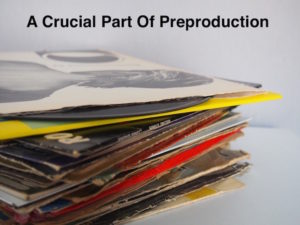- in Book Excerpt , Production by Bobby Owsinski
The Most Crucial Part Of Preproduction
 If you’re working with an artist or band, a critical time in the entire recording process is before you actually record, which is known as preproduction. Many producers think of preproduction as working out parts with the artist or band in a rehearsal room, but there’s actually another part of preproduction that can be even more crucial to the entire process, as outlined in this excerpt from the 2nd edition of my Music Producer’s Handbook.
If you’re working with an artist or band, a critical time in the entire recording process is before you actually record, which is known as preproduction. Many producers think of preproduction as working out parts with the artist or band in a rehearsal room, but there’s actually another part of preproduction that can be even more crucial to the entire process, as outlined in this excerpt from the 2nd edition of my Music Producer’s Handbook.
“Getting to Know You
Almost always, the more time you spend in preproduction, the smoother the recording will go. In preproduction the songs are chosen, arrangements are worked out, and parts are learned so well that the only thing to concentrate on during recording is the execution of the performance.
Preproduction is often so much more than the process of working out songs. For a producer working with a new artist or band, it’s a time of getting to know each other. It’s important for the producer to learn the likes and dislikes of the artists he or she is working with—be it food, music, or politics—in addition to their working habits and idiosyncrasies.
Knowing these things can help the producer determine how far to push a singer, or discover what gets the best performance out of the guitar player, or the signs of when the drummer is getting tired, or the hot-button issues of the day to stay away from. If you’re going to be working closely with an artist, even for a short time, the more you know about him or her, the better you can serve the project.
One of the most important aspects of getting to know an artist is learning what music she loves, was influenced by, and is listening to now.
Back in the days of the vinyl record, one of the most effective ways of doing this was for the producer to go to the artist’s house and have them throw a bunch of albums from their collection on the floor and then describe what they liked and didn’t like about each one.
Today, it’s more about looking at a favorite Spotify playlist, but the same thing is accomplished. Among the questions to ask might be the following:
- What do you like or dislike about the artist you’re listening to?
- Do you like the sound of the recording?
- What recordings do you like the sound of?
- What are some of your favorite records? Why?
- What Who are your biggest influences? Why?
- If you have a body of work as a producer already, what does the artist like about you? Why?
You can add any number of questions to those above, but can you see where this is heading? This is the information that you need to help attain the artist’s vision.
It gives you a common point of reference so that you can say, “Let’s go for a sound like the lead guitar on The Cure’s “Boys Don’t Cry,” and have the artist know exactly what you mean because you’ve found out in preproduction that’s one of his favorite songs.
Or if the artist says to you, “Can we get the sound like on The Weekend’s “Can’t Feel My Face,” you’ll know exactly what he’s talking about.”
You can read more from The Music Producer’s Handbook and my other books on the excerpt section of bobbyowsinski.com.

